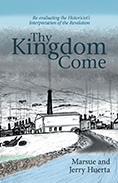
 |
Thy Kingdom Come: Re-evaluating the Historicist's Interpretation of the Revelation
by Marsue and Jerry Huerta
iUniverse
This contemporary history argues that traditionalists need to update their perception of the Book of Revelation. By evaluating the Revelation prophecies to that of the modern-day church, the authors look into the illustrations of Revelation without the "ad hoc rationalizations" that often portray it. In doing so, they attempt to prove the view of Professor David J. Engelsma of the Reformed Church who stated in The Church Today and the Reformation Church: A Comparison that "prophecies are best interpreted after they are fulfilled.”
This progressive treatise has a wide range of sources, quotes, and ideological explanations throughout the text. Some of the topics include criticism of historicism, Libertarian free will, progressive revelation, covenentalism, theism, and open theism. There is a plethora of biblical language that might be confusing without a theological background, but the authors counter this by providing a glossary as well as explaining terms within the text. The authors also give further explanations by delivering in-depth sources, including quotes from the Bible, articles, dissertations, and theological treatises used in research. The organizational layout provides a complete narration but also summarizes the main prophecies of Revelation.
The organization of the text helps readers to move down a linear path that allows them to digest the material. However, it is the explanations from the authors that make the book. The sharp reasonings make it very clear as to what the authors are saying and what they want the reader to take away. The vocabulary, structure, and research throughout are great for anyone who wishes to explore contemporary criticisms of the interpretation of Revelation. However, this analysis is not just for those who would like to expand their knowledge of the book but also for those looking for a new perspective on contemporary histories and how they are approached.